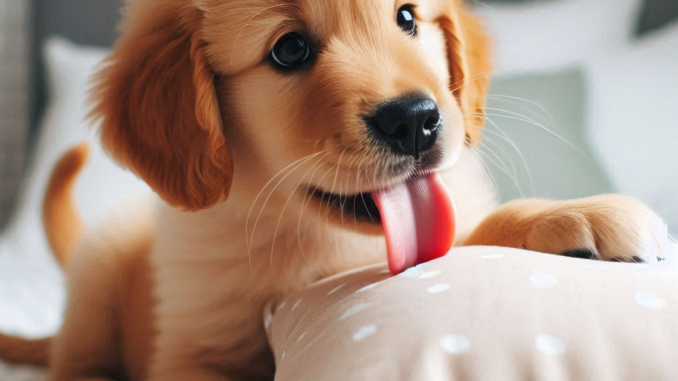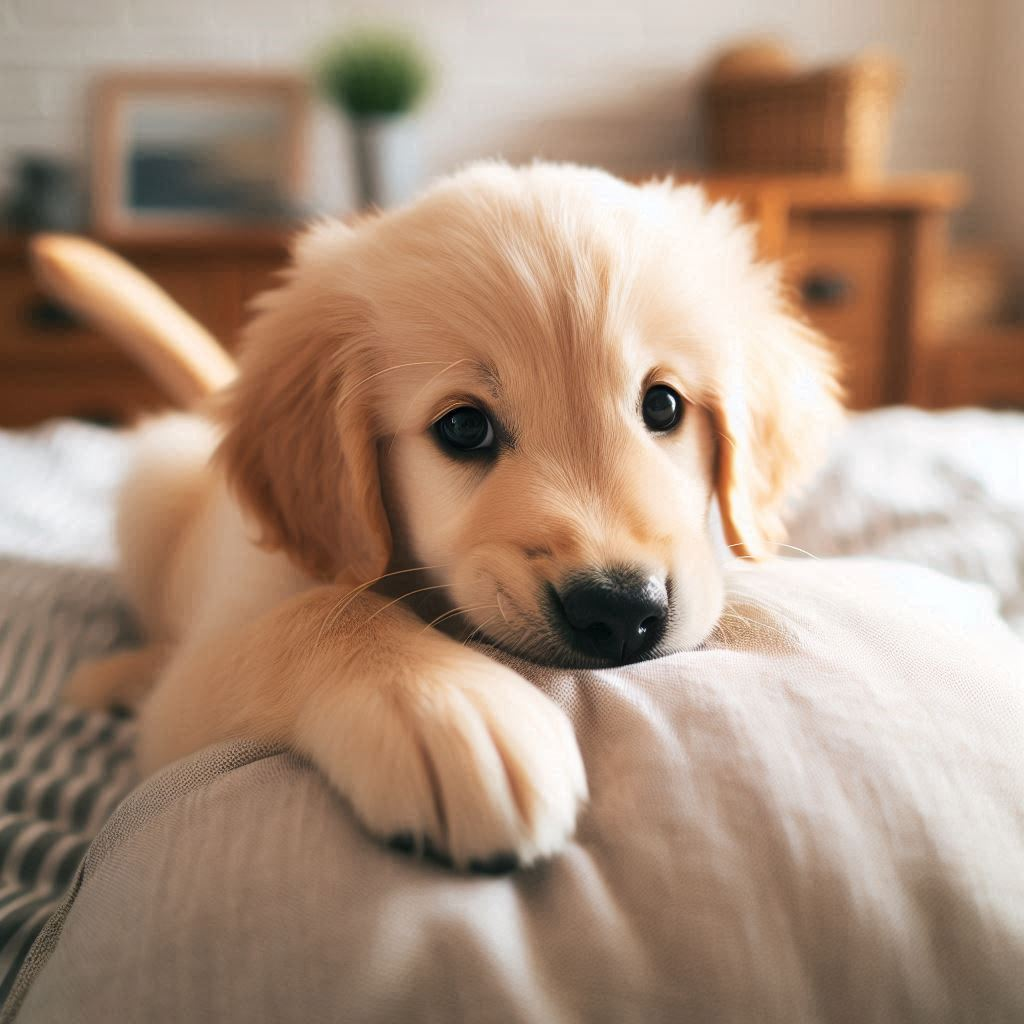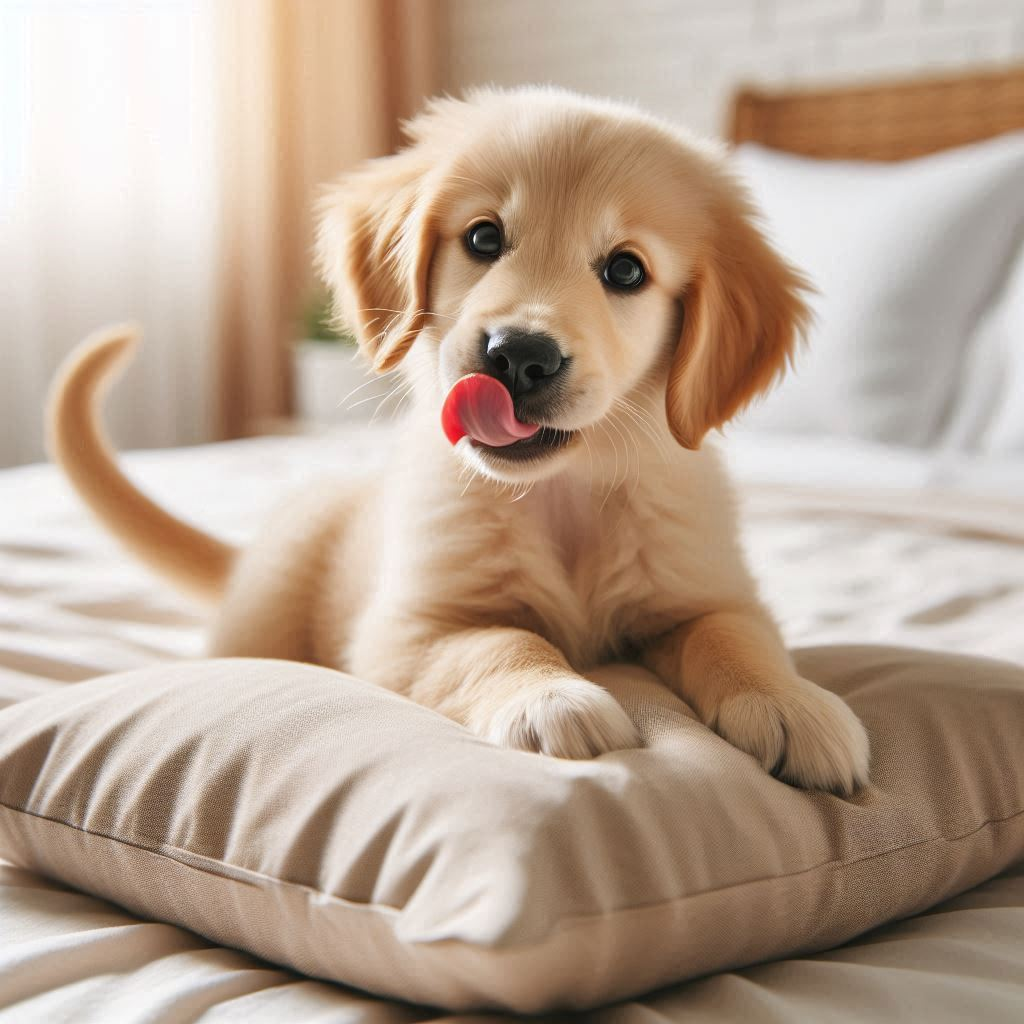
Why Does My Dog Lick My Pillow?
Have you ever caught your furry friend in the act of licking your pillow and wondered, “What’s going on here?” You’re not alone in this puzzling situation. Many dog owners have witnessed their pups engaging in this peculiar behavior, leaving them scratching their heads. In this post, we’ll dive deep into the reasons behind your dog’s pillow-licking habit and what it might mean for your four-legged companion.
Quick Answer: Dogs may lick pillows for various reasons, including seeking comfort from your scent, showing signs of anxiety or stress, attempting to get your attention, or potentially indicating an underlying health issue. While often harmless, excessive licking might warrant a closer look at your dog’s overall well-being.
The Fascinating World of Canine Behavior

Before we jump into the specifics of pillow licking, let’s take a moment to appreciate the complex and often amusing world of dog behavior. Our canine companions have a rich tapestry of instincts, emotions, and learned behaviors that shape their actions. Understanding these can help us better interpret their quirky habits – pillow licking included!
Instinctual Behaviors: A Walk on the Wild Side
Dogs, despite their domesticated status, still carry many instincts from their wild ancestors. These instincts often manifest in ways we might find odd or even frustrating. Let’s explore how these ancient drives might relate to your dog’s pillow-licking habit:
- Scent Marking: In the wild, dogs use scent to communicate and mark territory. Your pillow, rich with your scent, might be an irresistible target for your dog to “claim” through licking.
- Pack Behavior: Wolves in a pack often show affection by licking each other. Your dog might be extending this behavior to your pillow as a proxy for you.
- Comfort Seeking: Wild canines often seek out familiar scents for comfort. Your pillow, carrying your scent, might serve as a source of security for your dog.
The Nose Knows: The Power of Scent in a Dog’s World
We can’t overstate the importance of scent in a dog’s life. Their sense of smell is estimated to be 10,000 to 100,000 times more powerful than ours. This super-powered nose plays a crucial role in how they interact with their environment, including your pillow.
Your pillow is like a scent library for your dog. It carries traces of:
- Your personal scent
- Any products you use on your hair or face
- Environmental odors you’ve picked up during the day
For your dog, licking the pillow might be a way of “reading” this scent information and feeling closer to you.
Medical Considerations: When Licking Might Signal Health Issues
While often harmless, sometimes excessive licking can be a red flag for underlying health problems. As responsible pet owners, it’s crucial to be aware of these potential issues:
Gastrointestinal Distress: A Gut Feeling
Dogs sometimes lick objects, including pillows, when they’re experiencing stomach discomfort. This behavior might be an attempt to soothe their upset tummy or even an instinctual search for grass-like substances to induce vomiting.
Allergies and Skin Irritations: The Itch Factor
If your dog is dealing with allergies or skin irritations, they might lick various surfaces, including your pillow, as a way to alleviate discomfort. Keep an eye out for other signs of allergies, such as:
- Excessive scratching
- Red or inflamed skin
- Frequent ear infections
- Sneezing or runny eyes
Dental Issues: A Real Pain in the Mouth
Oral discomfort can lead to unusual licking behaviors. If your dog is experiencing dental pain, they might lick your pillow as a way to soothe their mouth or distract themselves from the discomfort.
Behavioral Explanations: The Psychology Behind the Lick

Often, a dog’s pillow-licking habit is rooted in their emotional and psychological state. Let’s explore some common behavioral reasons for this quirky habit:
Anxiety and Stress: Licking as a Coping Mechanism
Just like humans might bite their nails when stressed, dogs may engage in repetitive behaviors like licking to self-soothe. Your pillow, with its familiar scent, might become a target for this anxiety-induced behavior.
Common Anxiety Triggers for Dogs
- Separation from their owners
- Changes in routine or environment
- Loud noises (thunderstorms, fireworks)
- Unfamiliar people or animals
Attention-Seeking Behavior: “Look at Me, Human!”
Dogs are clever creatures, and they quickly learn which behaviors get a reaction from their humans. If licking your pillow consistently grabs your attention – even if it’s negative attention – your dog might continue the behavior to engage with you.
Boredom: When Idle Paws Turn to Mischief
A dog with pent-up energy and not enough mental or physical stimulation might turn to pillow licking as a way to alleviate boredom. This behavior can become a habit if not addressed.
A Tale of Two Pillows: My Experience with Max
Let me share a personal story about my own experience with pillow-licking behavior. My golden retriever, Max, developed a habit of licking my pillow whenever I left for work. At first, I was baffled and a bit grossed out. Why was my otherwise well-behaved pup suddenly obsessed with my pillow?
After observing his behavior more closely, I noticed that Max would become visibly anxious as I prepared to leave for the day. He’d pace, whine, and then beeline for my pillow once I was gone. It dawned on me that this wasn’t just a quirky habit – it was Max’s way of coping with separation anxiety.
To address the issue, I started leaving an old t-shirt with my scent on Max’s bed. I also gradually acclimated him to my departures, starting with very short absences and slowly increasing the duration. With time, patience, and lots of positive reinforcement, Max’s pillow-licking habit diminished significantly.
This experience taught me the importance of looking beyond the surface behavior to understand the emotional needs driving our pets’ actions.
What Can You Do About Your Dog’s Pillow-Licking Habit?
If your dog’s pillow-licking habit is becoming a concern, there are several steps you can take to address the behavior:
Rule Out Medical Issues: A Visit to the Vet
First and foremost, it’s crucial to ensure there are no underlying health issues causing the behavior. Schedule a check-up with your veterinarian to rule out any medical concerns.
Enhance Mental and Physical Stimulation
A tired dog is often a well-behaved dog. Increase your pup’s daily exercise and mental stimulation with:
- Longer or more frequent walks
- Interactive puzzle toys
- Training sessions to learn new tricks
- Playdates with other dogs
Address Anxiety: Creating a Sense of Security
If anxiety seems to be the root cause, consider these strategies:
- Safe Space: Create a cozy, secure area for your dog with their bed and favorite toys.
- Calming Aids: Try using pheromone diffusers or calming music designed for dogs.
- Gradual Desensitization: Slowly accustom your dog to being alone or facing their anxiety triggers.
- Professional Help: Consider working with a certified dog behaviorist for severe anxiety cases.
Redirect the Behavior
When you catch your dog in the act of licking your pillow, gently redirect them to a more appropriate activity, such as playing with a favorite toy or engaging in a quick training session.
Wrapping It Up: Understanding Your Pillow-Licking Pup
Your dog’s pillow-licking habit, while sometimes puzzling, is often rooted in their instincts, emotions, or physical needs. By taking the time to understand the underlying causes, you can address the behavior effectively and compassionately.
Remember, every dog is unique, and what works for one might not work for another. Patience, consistency, and a lot of love go a long way in helping your furry friend develop positive behaviors.
Have you successfully tackled a pillow-licking habit with your dog? Or maybe you’re still scratching your head over your pup’s peculiar pillow fascination? Share your experiences in the comments below – your insights might just help another puzzled pet parent!
And if you’re ever in doubt about your dog’s behavior, don’t hesitate to consult with your veterinarian or a professional dog behaviorist. After all, our four-legged friends can’t talk, so it’s up to us to be their advocates and ensure they’re happy, healthy, and feeling secure – even if it means sacrificing a pillow or two along the way!


Leave a Reply